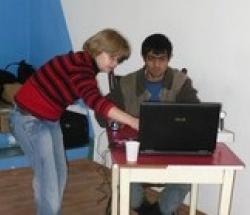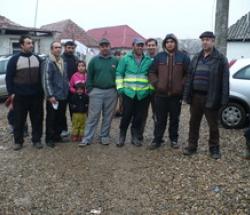| Brief description | Integration of Roma into the labour market. |
|---|---|
| Region | Internal EU borders |
| Countries | Hungary (HU) – Romania (RO) |
| Location | Euroregion Bihor (RO) – Hajdu-Bihar (HU) |
| Type of project partners | Educational institutions |
| Size (total budget including EU grants) | € 50,000 to € 200,000 |
| Main themes | Employment, labour mobility and social inclusion |
| Keywords (Types of Activities) | Education and training Research and studies Publications, websites, databases |
| Keywords (Aspects of Good Practice) | Genuine cross-border dimension Genuine cross-border impact Good dissemination Good sustainability |
| Background and Objectives | Issues concerning the low employment rate of the Roma are very similar at both sides of the Hungarian-Romanian border. Due to this similarity, and as the result of the emergence of a common labour market in the border region, coordinated strategies and ways of action have been proven necessary in order to work out suitable solutions for improving the employment opportunities of Roma. In both Romania and Hungary, the former regimes developed assimilation policies, which encouraged the employment of Roma. After 1990 however, the situation of Roma became even worse, due to the economic transition. The low educational level of Roma, together with the persisting discrimination against them and a number of cultural and social factors deriving from the traditional way of life of Roma communities have resulted in them encountering huge difficulties in the labour market. This situation is constantly generating extreme poverty and social exclusion. The current economic crisis is further diminishing the employment opportunities available to the poorly educated and unskilled population groups, among them the Roma.
The main objective of the project was to provide professional and institutional support for the integration of the Roma population in the labour market of the Bihor-Hajdu-Bihar cross-border region. The specific objectives were:
|
|---|---|
| Main activities | The project developed solutions for improving the employment opportunities available to Roma throughout the Euroregion. Within the framework of project activities a know-how transfer took place between the partners involved, including the development of a shared methodology for testing the professional skills of Roma adapted to their specific needs and the development of unitary professional standards and training methodologies.
In addition to testing the professional abilities and skills of the Roma, the project studied the employment situation within the Roma communities, generating a list of occupations recommended for Roma, development of training standards for some of these occupations and setting up two centres for employment related information and counselling in Oradea and Debrecen. The target groups of the project were potential Roma employees within the economically active group from the Roma communities of Oradea (Roma population of 6000), Sanmartin (1070), Ineu de Cris (850), Biharkeresztes (838), Told (259); potential employers of Roma; institutions and specialists in the field of professional recruitment and training. |
| Main results | The project achieved the following specific results:
|
| Aspects of good practice | The project represented a systematic effort on a genuinely cross-border basis, with a strong dissemination and a sound basis for longer-term sustainability (counselling centres, employment guide, employment database). |
| Start and completion dates: | December 2009 – March 2011 |
| More information | http://www.huro-cbc.eu/en/project_info/160 |
| Partner | Universitatea Creştină Partium Romania, Bihor, str. Primăriei nr. 36., Oradea E-mail: partium@partium.ro |
|---|---|
| Partner | Humán Fejlesztők Kollégiuma Hungary, Hajdú-Bihar, 4025 Debrecen, Török Bálint u. 4. E-mail: hfk@t-online.hu |




